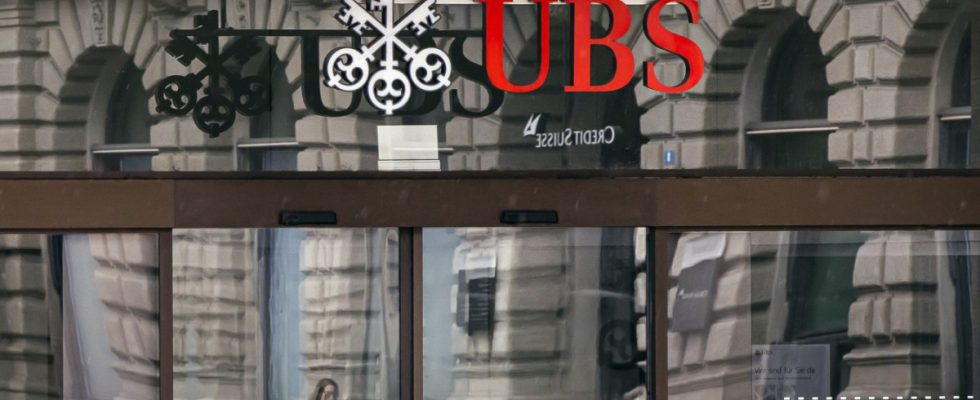Until now, changes in the management of a Swiss bank were something for financial connoisseurs. But since UBS took over its smaller rival Credit Suisse under pressure from the state and thus expanded significantly in one fell swoop, an entire country has been watching with interest what is leaking out from the headquarters in Zurich. On Tuesday morning, that was the news of UBS’s new structure and leadership team, put together by bank chief Sergio Ermotti, to handle the historic takeover.
Ermotti headed the institute from 2011 to 2020 and has now been brought back to the top of the group by the board of directors – probably also because his nationality seemed more appropriate to many in view of the state support for the deal: Ermotti is Swiss. His predecessor at UBS, Ralph Hamers, came from the Netherlands.
Sergio Ermotti has been running UBS again for a good month.
(Photo: STEFAN WERMUTH/REUTERS)
The first surprise on Tuesday related to the immediate future of Credit Suisse: According to UBS, the takeover should be completed “in the next few weeks”. After that, Credit Suisse will be a UBS subsidiary, but will initially continue to exist as a separate bank. Under the umbrella of UBS Group AG, UBS and Credit Suisse would “act independently until further notice”.
That’s remarkable, given that in the days and weeks following the decision to merge, there was a lot of talk about how different the cultures of the two banks were and how much Credit Suisse would have to adapt to UBS’s lower-risk profile. Now CS should continue to “act independently” – even if, as UBS makes clear, “some new instructions” should be introduced to ensure effective supervision. In the long term, however, CS is likely to merge with its rival: the intention is to “implement the integration in stages,” according to the statement.
Is the provisional continued existence of Credit Suisse perhaps also an indication of the future of Swiss unity? Immediately after the takeover decision in mid-March, several politicians called on UBS to sell Credit Suisse’s Swiss business, which had worked well until the end, as soon as possible. In this way, domestic banking competition could be restored and the enormous size of the new UBS could be scaled back somewhat. However, the bank does not want to comment on this on Tuesday: All options for Credit Suisse’s Swiss business will be examined and information will be provided in the coming months, they say.
The previous CEO of the rescued Credit Suisse, Ulrich Körner, surprisingly rises to the executive board of UBS.
(Photo: FABRICE COFFRINI/AFP)
The second surprise comes from the new management team that Ermotti has put together. Without exception, he relies on proven names that he knows from his earlier days at the bank – and on a man who everyone had actually written off long ago: Ulrich Körner, currently still CEO of Credit Suisse. Ermotti brought him into the UBS group management, even enabling him to rise after the past few months of scandal. According to the statement, Körner knows both companies. He will be responsible for “maintaining Credit Suisse’s operational continuity and client focus while supporting the integration process.”
Körner has only been CEO of CS since the summer of 2022 and is therefore not one of the main culprits in the downfall of the once proud Swiss bank. But his reform plan from last fall was not convincing. In particular, the partial spin-off of the investment bank and its transfer to the new unit CS First Boston provoked criticism. Former Citigroup banker Michael Klein, a member of the Credit Suisse board of directors until October, was set to buy out investment banking, a deal fraught with conflicts of interest that the bank has since halted. Körner was also accused of poor and clumsy communication in the midst of the worst crisis in the bank’s history.
Nevertheless: Ermotti is now planning with him. According to the Zurich finance portal Inside Paradeplatz, Körner’s UBS past should play a role: “The old-new CEO heaves his old-new intimates into the management of Big UBS.” In fact, from 2009 to 2020, Körner held several influential posts on the UBS executive board. So you know each other.
Many established top people keep their jobs
The same applies to the remaining members of the new leadership team, which has grown from 12 to 16 members. Many established top executives are simply keeping their posts: for example Iqbal Khan, head of asset management, Sabine Keller-Busse, president of the Swiss business, or Suni Harford, who will continue to head asset management. Other top positions were newly created, including the “Group Integration Officer”: The Swiss and long-time UBS woman Michelle Bereaux takes over the position with which the integration of the two major banks is to be managed. Beatriz Martin Jimenez, who was previously responsible for the financing of UBS and will in future take care of all areas that have to be processed in the course of the merger, is also new to the group management. Stefan Seiler, who has also been with UBS since 2011, will in future be responsible for human resources, building management and supplier management.
The clearest sign that Ermotti has only limited desire for new things in the coming turbulent months and years is the appointment of the chief financial officer: Todd Tuckner, who has been with UBS for almost 20 years, is taking over the post from Sarah Youngwood. She was only brought to UBS by Ralph Hamers in 2022, so she is unknown to Ermotti – and therefore nothing for his “all-star team” like them trade newspaper expresses.

